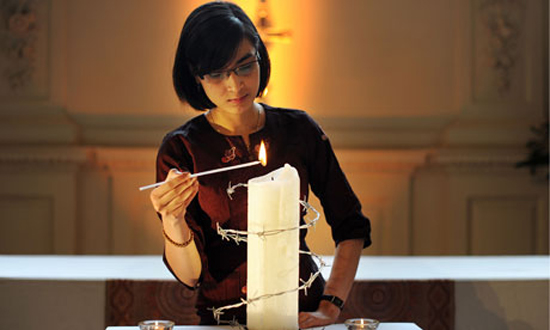
ANALYSIS: The international human rights defender Amnesty International celebrated its 50th anniversary on May 28.
The organisation has taken up the human rights causes of countless individuals throughout the world since its British founder, lawyer Peter Benenson, first penned an article in The Observer on that date in 1961.
He drew attention to those “imprisoned, tortured or executed because his opinions or religion are unacceptable to his government” after reading about two Portuguese students who had been jailed for proposing a toast to liberty in a Lisbon bar.
The very acts of both Benenson in writing that article and of the students in proposing that toast were exercises of political expression. In Benenson’s case it was ‘free expression’, while in the case of the students it was punished by a government opposed to its exercise.
Free expression is just one of many rights Amnesty International has defended over that half century. There are many other international organisations specialising in its defence alone, including Article 19, Index on Censorship and Reporters Without Borders (of which I am Australian correspondent).
It is a right Amnesty regards as “important for the personal development and dignity of every individual and vital for the fulfillment of other human rights”.
And rightly so. For without free expression, victims of human rights abuses would be unable to communicate their predicament and their supporters would be prevented from issuing their rally cries for change.
Alarming reading
A scroll through the latest news entries on Amnesty’s website makes for alarming reading. Libyan citizens at risk of hidden landmines, mass arrests and torture in Syria, a woman arrested for driving in Saudi Arabia, and the politically motivated jailing of two Russians on money laundering charges. These are serious matters going to the core human rights of security, equality and a fair trial.
Yet scratch the surface of many of these cases and you find accompanying gagging of free speech or retribution for its exercise. The Saudi woman, for example, had also committed the crimes of allowing a journalist to interview her while she was driving and of planning to publish video footage of herself driving.
Other cases involve blatant intimidation and gagging of journalists and bloggers. Like Moroccan journalist Rachid Nini, arrested last month for purportedly “undermining of a judicial decision, attempt to influence the judiciary, and reporting on untrue criminal offences”. In reality, he was just doing his job exposing his country’s anti-terrorism practices in breach of international conventions.
And Palestinian writer and academic Ahmad Qatamesh, seized by Israeli security forces without charge and being held for being an ‘unspecified security risk’.
The key international document is the United Nations Universal Declaration of Human Rights, which in 1948 enshrined free expression at Article 19: “Everyone has the right to freedom of opinion and expression; this right includes freedom to hold opinions without interference and to seek, receive and impart information and ideas through any media regardless of frontiers.”
At face value, this statement seems to give all the world’s citizens a right to free expression. But it was only ever meant to be a declaration of a lofty goal and has many limitations.
Better protections came internationally in 1966 when the UN adopted the International Covenant on Civil and Political Rights, prompting a series of binding treaties. The covenant introduced a right to free expression, again at Article 19: “Everyone shall have the right to freedom of expression; this right shall include freedom to seek, receive and impart information and ideas of all kinds, regardless of frontiers, either orally, in writing or in print, in the form of art, or through any other media of his choice.”
Special duties
However, the right is limited because the covenant imposes ‘special duties and responsibilities’ for the respect of the rights and reputations of others and for the protection of national security, public order, public health or morals.
Add to this the fact that many countries have not ratified the covenant and you are left without regulatory bite at this level. Complaints about individual countries’ breaches can be brought to the Office for the High Commissioner for Human Rights, but the processes can take several years and are often unresolved, as their annual reports demonstrate.
New technologies have brought their own communication freedoms, but also accompanying censorship and retribution. The so-called ‘Twitter revolutions’ throughout the Middle East and North Africa in 2010 and 2011 showed how social media could help generate movements for better human rights.
Yet countries with the highest level of censorship maintain tight control over expression and take firm action against online writers who use the Internet to question their authority. This is when the blogger becomes a ‘dissident’ and any use of new media for political expression – or even the use of certain media at all – can land the offender in jail. Reporters Without Borders has released a list of enemies of free Internet speech: Burma, China, Cuba, Iran, North Korea, Saudi Arabia, Syria, Turkmenistan, Uzbekistan and Vietnam.
They are countries where bloggers, journalists and other ‘dissidents’ have been imprisoned or tortured for daring to write what they think or for encouraging others to do so.
Governments in such countries block access to full Internet use via systems like the so-called ‘Great Firewall of China’. While the Internet is seen by many as a wonderful new tool for democracy, there is a downside to the use of social media and blogs by dissidents in countries that do not value free speech: their Web-based activities can be monitored quite easily by security forces and citizens’ use of such media can leave them dangerously exposed. Blogger Nay Phone Latt languishes in a Burmese jail on a 20 year sentence for reporting in his blog about the unfolding demonstrations against the government in Rangoon in 2007 and for describing how hard it was for young Burmese to express themselves freely.
Repressive regimes also launch engage in modern age propaganda techniques such as cyber-attacks on target websites and on ‘phishing’ to steal dissident password information to access their email addresses and other contact details.
Chronicle of abuses
No regional human rights convention exists in Asia and the Hong Kong-based Asian Human Rights Commission provides an ongoing chronicle of abuses, many involving the gagging of journalists, bloggers and dissidents.
Many of these cases may seem quite foreign to our values and way of life in Australia – the kinds of things that happen in far-flung exotic places that could never occur here.
The sad reality is that I am kept all too busy in my work for Reporters Without Borders in this western democratic nation regarded by its citizens as a bastion of free expression.
Since 1961 there have been scores of Australians arrested and jailed for the exercise of their rights of free expression, press freedom or freedom of assembly.
That period has included many protests where individuals have been detained – including those marching against the Vietnam War, apartheid and modern environmental, immigration and anti-globalisation causes.
Australian journalists have been arrested and jailed in recent years. Three reporters have served time since 1989 for refusing to reveal their sources in Australian courts. Journalist Derryn Hinch went to prison in 1986 for broadcasting prejudicial material about a sex offender in the lead-up to his trial and faces jail again in a current case over his naming of sex offenders in breach of suppression orders.
Earlier this month a Sydney Morning Herald journalist was arrested by Queensland police and his iPad was seized – all because he had reported upon a conference presentation by a security expert who had allegedly breached Facebook privacy settings.
This came just two months after the NSW Crime Commission demanded source informationfrom two Sydney Morning Herald journalists and their parent news group as part of its spat with the Police Integrity Commission.
'Critical' alert
Another indicator was news this month that the Commonwealth Immigration Department had upgraded to ‘critical’ the alert level for journalists trying to access to its detention centres.
These incidents do not amount to torture or assassination, but our concern is that censorship is a slippery slope and we need to be constantly on guard against governments and their agencies limiting our rights to free expression.
Australia is a rarity among western democratic countries because it lacks a bill of rights at national level enshrining human rights like free expression. We have no equivalent to the US First Amendment which states: "Congress shall make no law … abridging the freedom of speech, or of the press."
Most Commonwealth countries’ constitutions including those of Canada, India and Papua New Guinea guarantee freedom of expression.
But such a freedom is not stated explicitly in the constitution of Australia. In the 1990s our High Court ruled there was an ‘implied right’ to free expression on matters of government and politics in the Constitution. But that is negotiable, and shifts each time the court is called upon to rule on it.
New Zealand’s Bill of Rights Act 1990 states at s. 14: ‘Everyone has the right to freedom of expression, including the freedom to seek, receive, and impart information and opinions of any kind in any form’.This year the NZ Supreme Court even found the right protected Valerie Morse, an anti-war protester who burned her country’s flag during an Anzac Day dawn memorial service in Wellington. Her conviction for offensive behaviour was set aside on this basis.
Australia lacks this kind of protection. It is certainly not a free expression haven. While we do not have a chronic problem of the frequent arrest and torture of dissidents and intellectuals, we certainly need to keep a close watch on the workings of the law as legislators and judges continue to make laws eroding free expression.
While the world has changed markedly in the 50 year life of Amnesty International, a constant has been the natural tendency of those in power to gag their critics.
Active membership of such organisations can at the very least remind those who abuse their positions that they are being watched, and at best motivate them to change their ways.
© Mark Pearson 2011



